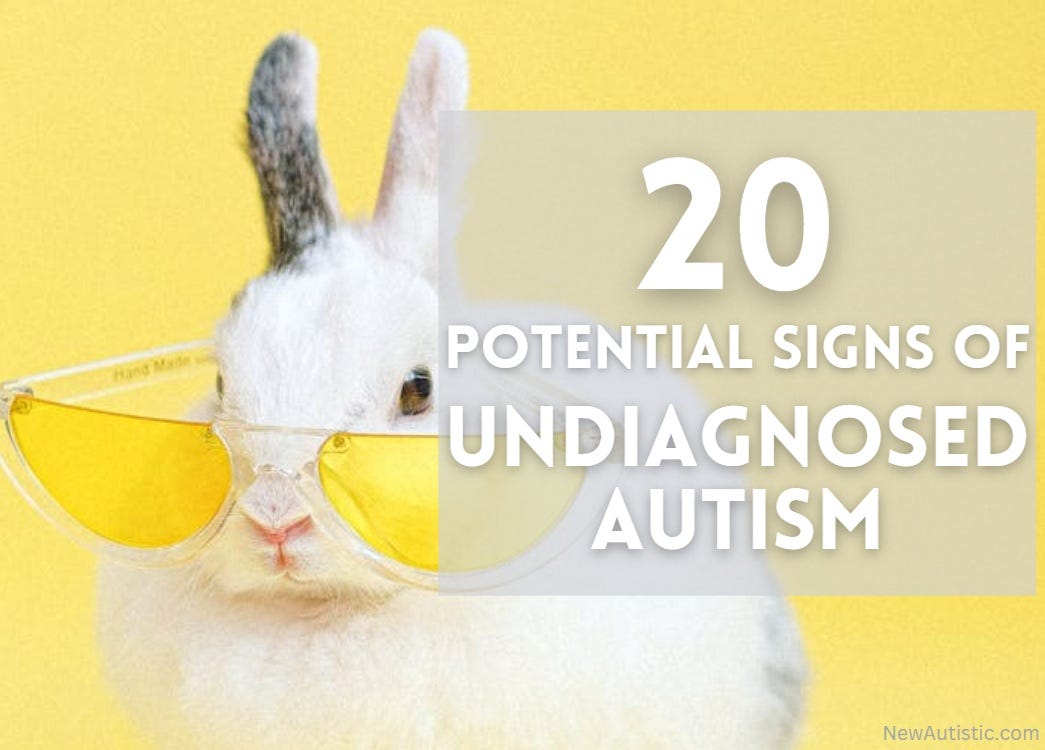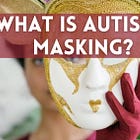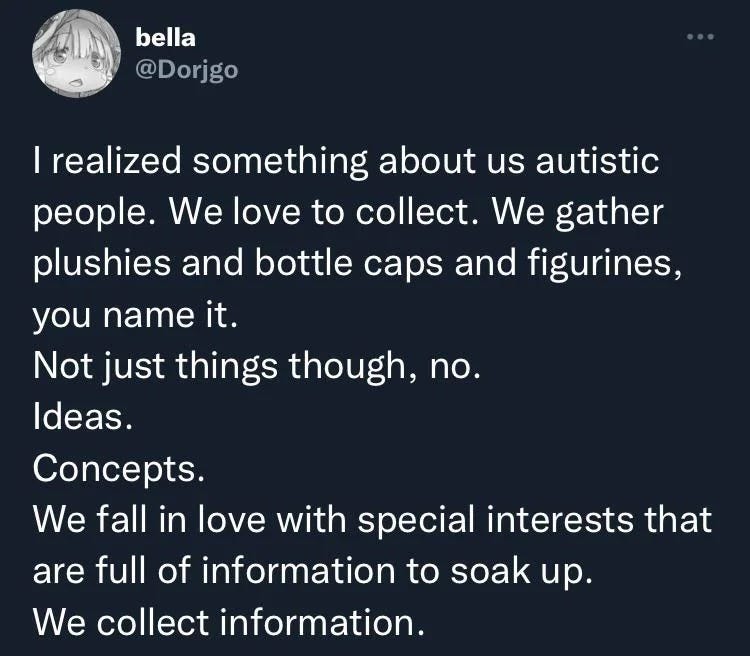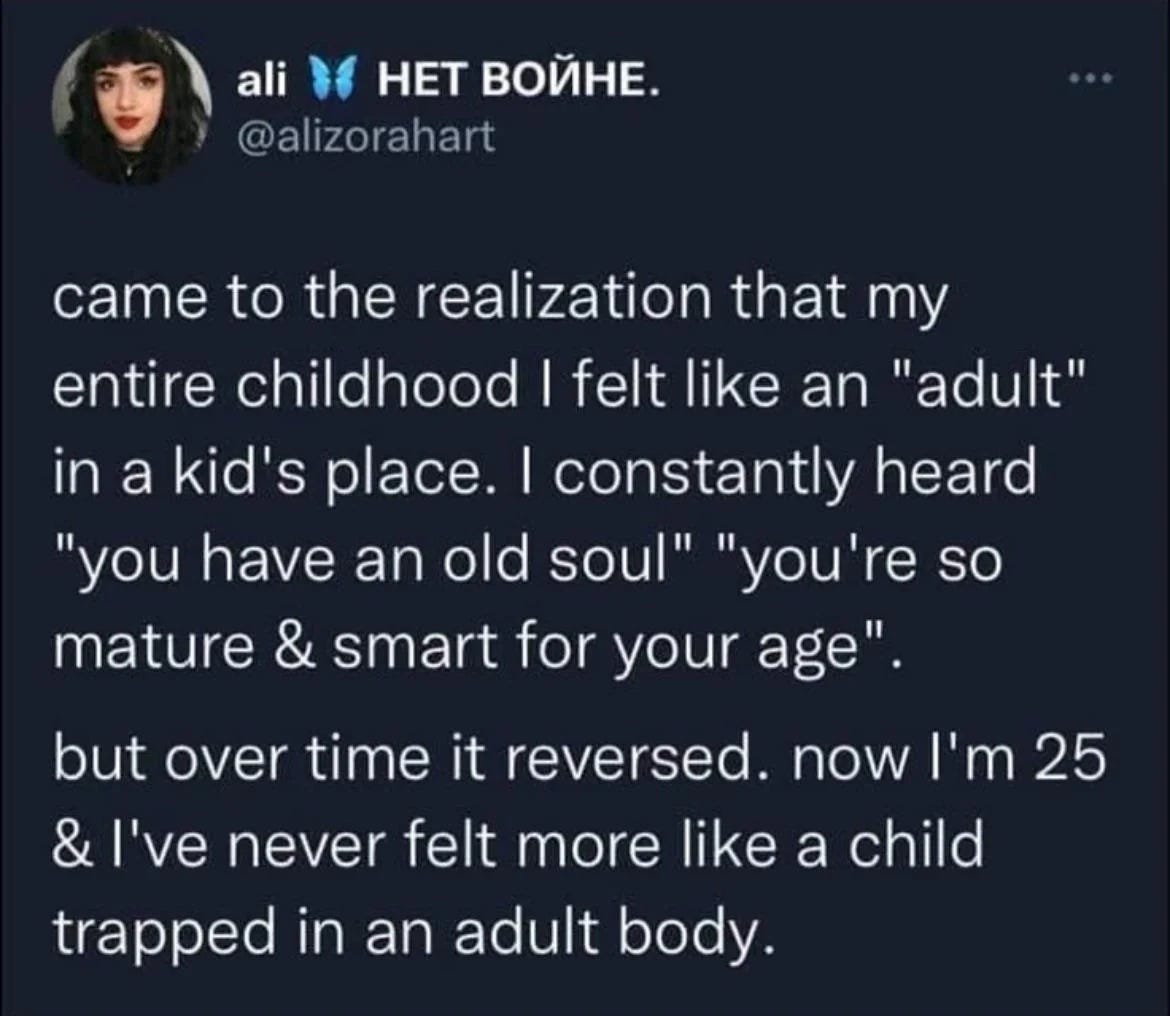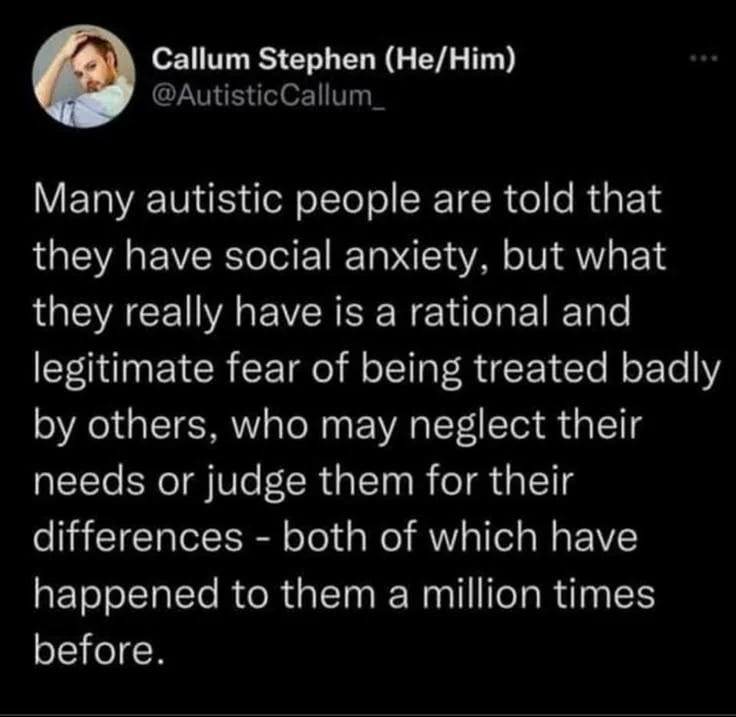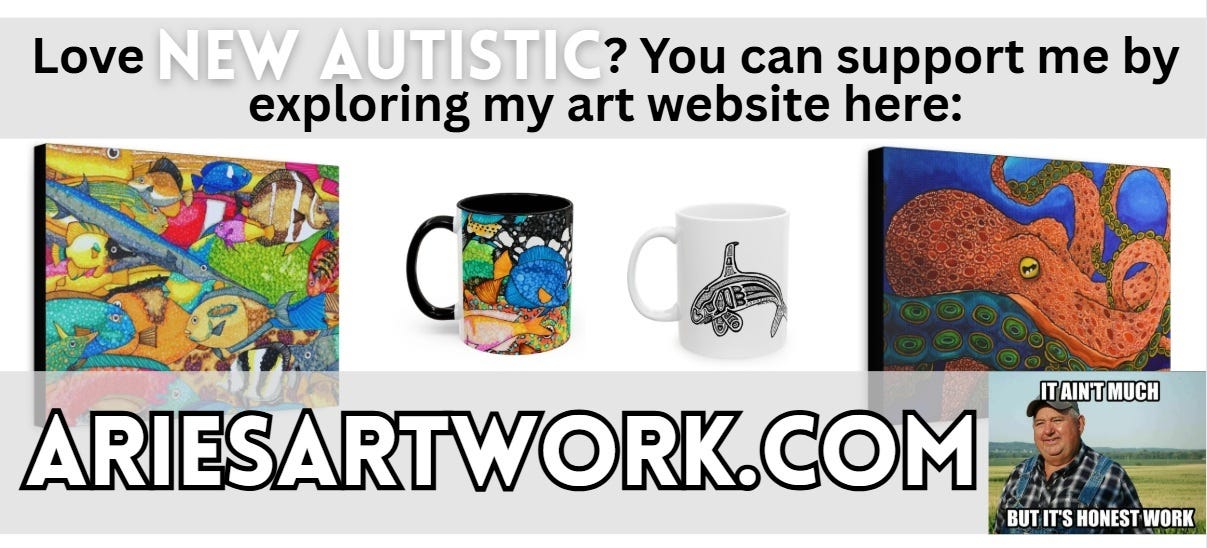You’re Not Broken, You’re Just Autistic: 20 Signs You Missed
If You Relate to This List, You Might Be on the Spectrum (And That’s Okay)
20 Potential Signs of Undiagnosed Autism
Many undiagnosed autistic people go through life believing their unique habits, sensitivities, and social struggles are simply part of their personality. In reality, what feels “normal” to them can actually be subtle signs of autism—especially when these traits show up consistently and impact daily life.
A lot of these 20 signs get brushed off as someone just being “kinda weird” or “overly sensitive,” but they may actually point to autism.
Important Note: This list is for awareness, not diagnosis. If you recognize yourself or someone you love here, consider speaking with an autism-informed professional for support and evaluation.
1. Constantly Replaying Conversations in Your Head
Many autistic individuals spend hours mentally replaying or ruminating on past conversations, analyzing every word and inflection to figure out if they made a social misstep. This can feel like a natural form of introspection, but it's often rooted in anxiety about social rules that feel invisible or unclear.
Rather than moving on easily from interactions, autistic people may become stuck in loops of self-doubt, trying to decode unspoken meanings or anticipate future consequences. And when you’ve spent your whole life being misunderstood, this unfortunately makes quite a bit of sense.
2. Exhaustion After Social Events
Socializing as an autistic person can often feel like a performance, especially when you're constantly monitoring your body language, tone of voice, and responses. For undiagnosed autistic people, even short interactions can leave them mentally and physically drained.
This is often mistaken for introversion, but it goes deeper than that: it's the toll of masking autistic traits to navigate neurotypical spaces. Research shows that masking or camouflaging autistic traits requires intense emotional and physical effort, often leading to immediate exhaustion, anxiety, and longer-term harm.
3. Strong Preference for Routine and Predictability
Changes in plans can trigger a disproportionate sense of distress in autistic people because we build routines that help us feel secure and in control of our environment. When something disrupts that, it can feel like the rug has been pulled out from under us. Others might see our reactions and call us "rigid" or "inflexible," but for the autistic brain, predictability is a form of self-regulation.
4. Difficulty with Small Talk
Engaging in casual chit-chat can feel pointless or even stressful. Many autistic people prefer deeper, more meaningful conversations and struggle with the performative nature of social pleasantries. (And let’s be real: the only socially acceptable answer to “How are you?” is “Good,” so let’s not pretend like most people really care. It is a performance.)
We also tend not to understand why others value small talk so highly, and our avoidance of it is often misread as aloofness or disinterest when it’s really that we’d prefer to talk about something with more depth.
5. Intense Special Interests
Rather than dabbling in a wide variety of hobbies, autistic individuals often dive deeply into one or two interests, becoming highly knowledgeable and passionate about them (*gestures at this website and its content*). These interests often provide joy, comfort, and even a sense of identity. Others might view this as being obsessive or "too much," but it's a common and fulfilling trait in autistic people. Go big or go home, baby!
6. Literal Thinking
Understanding sarcasm, metaphors, or abstract language can be a challenge for many autistic people. We tend to interpret language very literally, which can lead to confusion or unintentional misunderstandings. This isn't a lack of intelligence, but a different cognitive style that prefers direct and precise communication. In neurotypical terms, I guess you could say that we don’t like to beat around the bush.
7. Sensory Sensitivities
Everyday sensations that others barely notice—like fluorescent lights, background noises, or clothing tags—can be overwhelming for autistic people. (“How does no one else hear that buzzing sound?!”) We often have heightened or altered sensory processing, making certain environments physically uncomfortable or even unbearable. Undiagnosed autistics may not realize this isn't everyone's experience and assume they're just "picky," “sensitive,” or easily irritated.
8. Masking or Mimicking Others Socially
To avoid judgment or fit in, many autistic people subconsciously mimic others' gestures, tone, or mannerisms. This camouflaging behavior is often developed over years and can be so automatic that the person doesn't even realize they're doing it! While it helps us blend in, it also contributes to burnout and a fragile sense of identity.
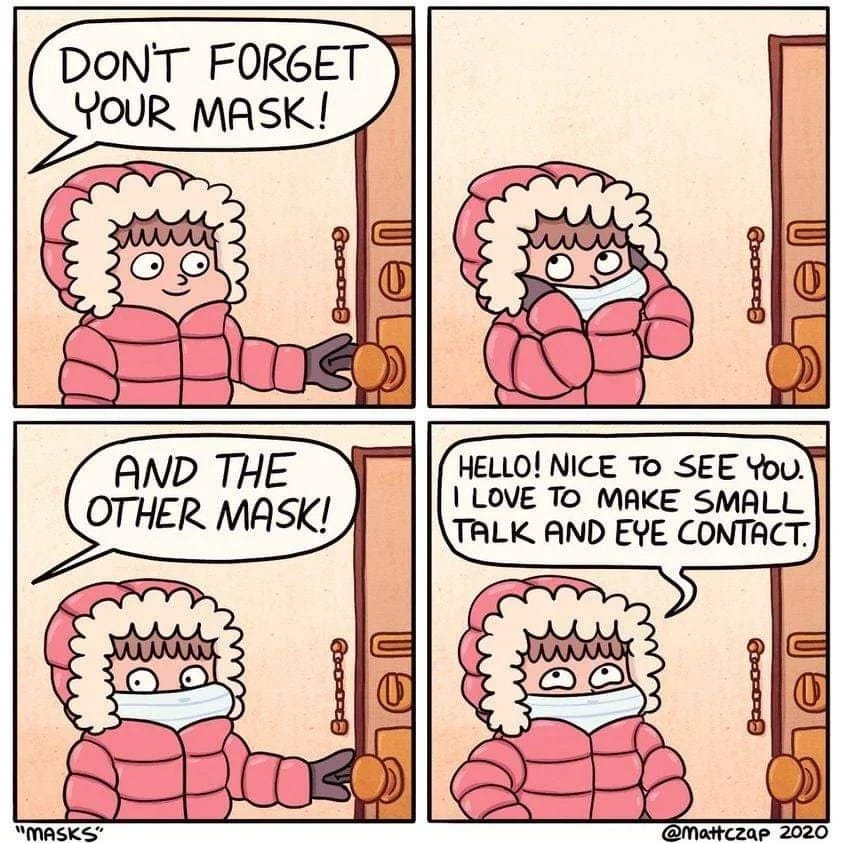
9. Feeling “Different” Without Knowing Why
From a young age, many undiagnosed autistic individuals feel like outsiders. We notice that we don’t connect with peers the same way others do, but can’t quite explain it. I actually wrote a whole blog post about this topic:
This persistent feeling of being out of step with the world often leads to anxiety, loneliness, and a deep desire to find a sense of belonging.
10. Avoiding Eye Contact
Eye contact can feel invasive, intense, or distracting. While many neurotypical people use eye contact to build rapport, autistic individuals often find uncomfortable or even painful. We often learn to fake it or to focus on a point near someone’s eyes to avoid seeming rude, and all without understanding why it feels so unnatural.
11. Talking Too Much or Too Little in Conversations
Navigating the rhythm of conversation can be tricky. Some autistic people dominate discussions without realizing it while others go silent out of fear of saying the wrong thing. This difficulty with turn-taking and reading social cues often leads to misunderstandings and social rejection for us.
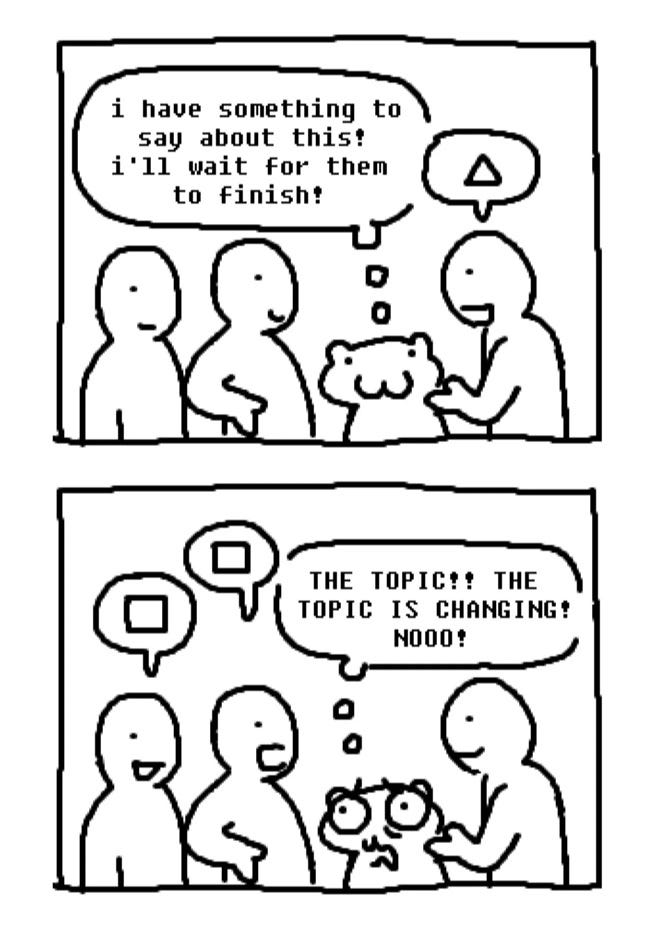
12. Sensory-Seeking Behaviors
In addition to sensory avoidance, autistic people may seek out specific sensations or stims to soothe and regulate themselves. This could include rocking, tapping, or pacing. These repetitive behaviors may look odd to others, but serve an important self-calming and self-regulation function for autistics.
13. Trouble Starting or Transitioning Between Tasks
Even tasks autistic people are excited about can feel impossible to begin. This executive dysfunction is often misread as laziness or procrastination, but it's really about struggling with the mental steps involved in initiating or switching focus. Routine and structure can help, but it doesn’t eliminate the challenge.
14. Difficulty Understanding Unspoken Rules
Many autistic people find social norms baffling and arbitrary. We often need to learn explicitly what others pick up intuitively: how close to stand, when to speak, how to greet someone, etc. Without clear guidelines, we often feel lost or repeatedly make social errors we don’t understand.
15. Anxiety Around Phone Calls or Unexpected Visitors
A ringing phone or an unannounced knock can spark panic in autistic people. These interruptions feel intrusive, unpredictable, and demand rapid social performance. Many of us dread these moments and go to great lengths to avoid them, although that often leads to us being labeled as shy or antisocial.
16. Highly Specific Food Preferences or Aversions
Food isn't just about taste but also texture, smell, and even color. Autistic individuals often have "safe foods" we eat repeatedly, and some of us may even avoid entire food groups due to sensory issues. This can be misread as being fussy or having disordered eating when it’s actually more sensory-based.
That being said, a sizable proportion of autistic people have Avoidant/Restrictive Food Intake Disorder (ARFID), which can lead them to eating an even more restricted diet.
17. Deep Empathy—but Difficulty Expressing It “Correctly”
Despite the stereotype of lacking empathy, many autistic people feel emotions deeply and care intensely about others. However, we may not show it in conventional ways, leading others to misunderstand us as cold or indifferent (sometimes referred to as the double empathy problem). In truth, some of us experience overwhelming emotional resonance to the point where it can become debilitating.
🧠 NeuroTip: If you resonate with this topic, it might be worth looking into empathic attunement.
18. Being Labeled as “Too Sensitive” or “Too Intense”
Whether it’s reacting strongly to injustice, personal criticism (which can tie into rejection sensitivity dysphoria [RSD]), or sensory overload, autistic people are often told to "toughen up" or to “stop being so sensitive.” However, our intense reactions aren't overreactions. Instead, they reflect a nervous system that's more sensitive to both emotional and physical stimuli.
19. Social Burnout that Lasts for Days
After masking and navigating complex social environments, autistic people may need significant recovery time. This isn’t just introversion; it's social exhaustion that affects our cognitive function, mood, and even physical health. It often goes unnoticed because we hide it well—until we crash.
20. Struggling to Ask for Help or Advocate for Yourself
Expressing needs can be incredibly difficult for autistic people, especially in high-pressure or emotionally charged situations. We fear being misunderstood, rejected, or burdensome. We often stay silent until we reach a breaking point, at which others may only then notice something is wrong.
Conclusion: It Was Never “Just You”
If you saw yourself in this list, you’re not alone—and you’re most certainly not broken. Many autistic people go undiagnosed for years (or even decades) because their traits are misunderstood, masked, or mistaken for something else entirely. (Personally, I wasn’t diagnosed until I was 34 years old!) What the world sees as quirks, flaws, or personality traits may actually be signs of a beautifully different neurotype trying to thrive in a world that isn’t built for it.
Recognizing these patterns can be the first step toward self-understanding, healing, and finding the support you deserve. Whether you pursue a formal diagnosis or simply start connecting the dots for yourself, know this: your experiences are valid, and there’s nothing wrong with needing different tools, routines, or boundaries to feel okay in the world.
Thanks for Reading!
Thanks for taking time out of your busy day to spend some time with me! I encourage all of my readers to RISE (Reflect, Improve, Strengthen, & Evolve) with me because healing is a lifelong journey; it’s not always easy, but it’s always worth it. You are loved, cherished, and valued. Don’t ever let anyone ever convince you otherwise.
My commitment to bringing you FREE, well-researched, and comprehensive content means I spend considerable time and effort writing each article or post without compensation.
Want to Support Me?
The simplest FREE way you can support me is by subscribing, sharing, or leaving a comment:
I believe in keeping my content accessible to everyone, without paywalls, because I know the work I do matters. For that reason, I’m beyond grateful for any financial support! If you'd like to support me and my work, check out my art website at AriesArtwork.com to bring home something unique or find a gift for that special someone in your life:
I’ll see you again when I’ve got a new info-dump for you, my Newtistics Crew!
—Skylar Aries



